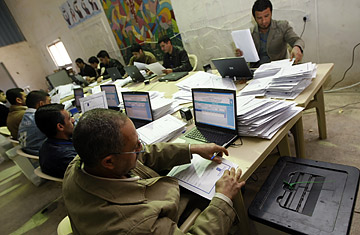
Ballots are sorted at a tally center in Baghdad on Feb. 5
Ayad Allawi answers with the practiced evasion of a seasoned politician when asked whether he'd like another shot at the job of Iraq's Prime Minister. "Definitely not in a sectarian regime," Allawi told TIME at the Baghdad headquarters of his political party, the Iraqi National Accord. "I respect religion. But religion needs to be de-politicized." Despite the gains made by Allawi's secular list in last weekend's provincial elections, the big winner at the polls was the Shi'ite-led alliance of Prime Minister Nouri al-Maliki — who remains the man to beat in the national election slated for next year.
Allawi, a Shi'ite and former Baathist who was tapped by the U.S. occupation authority to be Iraq's first Prime Minister after the ouster of Saddam Hussein, has always billed himself as stridently secular. But when Iraqis were given the right to choose their leaders at the polls, Allawi lost out to the parties based on Shi'ite and Sunni identity. Since then, he and his party have been working to promote a more secular approach to Iraqi governance, and the preliminary returns released on Thursday for Iraq's provincial elections show they are making gains — at least relative to their marginalization in the two previous national elections. (See pictures of the return to normalcy on Iraq's streets.)
Al-Maliki appears to have consolidated his power by trumping the Shi'ite rivals on whose support his government had long depended. Initial tallies show that candidates loyal to the Prime Minister won comfortably in 10 of the 14 participating provinces, including Baghdad. They failed to win, however, in the largely Shi'ite province of Karbala, in the mixed provinces of Diyala and Nineveh, and in largely Sunni Anbar, where unresolved allegations of election fraud among rival Sunni contenders have left the province fearing an outbreak of violence.
Al-Maliki has used his tenure as Prime Minister to emerge as the preeminent political figure in Iraq, enjoying a groundswell of popularity following his government's largely successful efforts alongside U.S. forces to battle militias and insurgents throughout southern Iraq and Baghdad. Still, Allawi's party is pleased with its performance: Iraqi National Accord–backed candidates drew 13.9% of the votes to finish second in the northern Salahuddin province, while in Baghdad they won 8.6% of the initial returns — in fourth place, although with a share of the vote close to that of the lists that finished second and third.
Iraq's provincial councils will elect regional governors and focus largely on local issues, but the election results were seen as an important bellwether of the national trend for next year's parliamentary election. And Allawi is hoping to grow his party's share of the vote. "We need to see a departure from sectarianism and the establishment of national institutions for this country, starting from the judiciary, and have, really, the rule of law prevail in Iraq," says Allawi, complaining of corruption and a Shi'ite sectarian bias in the al-Maliki government. But as much as Allawi may see signs of a renaissance in the results, which will be finalized in a couple of weeks, Prime Minister al-Maliki will feel he passed with flying colors in this first major test of his political prospects.
— With reporting by Tariq Anmar / Baghdad
